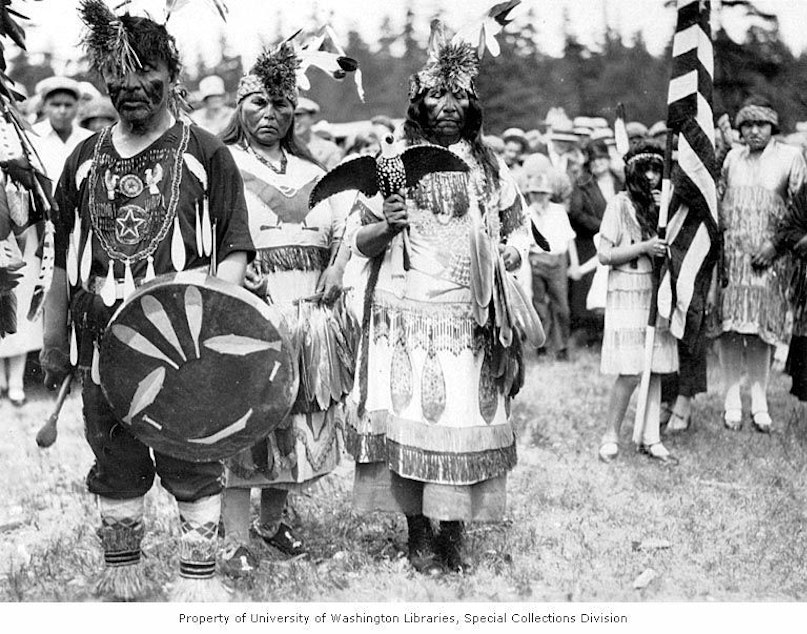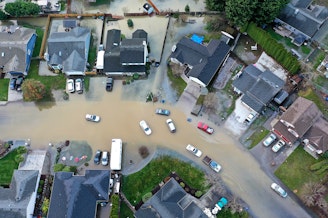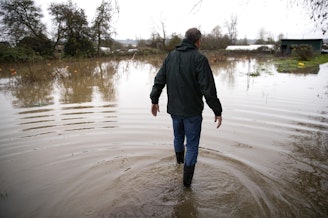Sacred catch
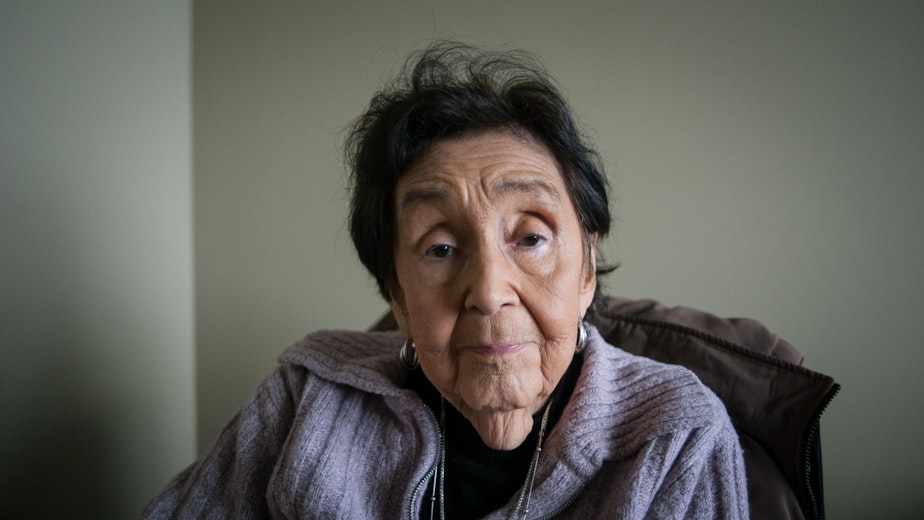
“Forgive me if this is a rude question, but how old are you?”
Ramona Morris responds slowly into a microphone, her voice a gentle warble. “That’s very rude,” she says, “but I’ll answer it. Eighty-two.”
Eighty-two, but her memory runs back centuries.
“My name is Ramona Morris,” she tells the interviewer, “and I’m a Lummi elder.”
She pronounces her Indian name, Hai-o-litza.
“That’s from my mother’s side,” she says. “She was a Yakama.”
This series originally aired on KUOW in 2014.
Before Salmon Was King, Before Salmon Was Greed
E
ighty-two years ago, when Morris was born on the Lummi reservation, salmon dominated these Pacific waters, a spidery network of waterways called the Salish Sea. It’s a complex estuarine system that includes Puget Sound and the straits of Georgia and Juan de Fuca.
The Salish Sea has long been fished by the Lummi tribe, which was once made up of nomadic fishing tribes that canoed the waters to harvest food from sea and land. The tribe is now based on a small reservation north of Bellingham, Wash.
Salmon is sacred to the Lummi. It’s their schelangen, or way of life.
“It was our food, just like many other animals and things,” Morris says. “They were placed here for our use.”
Before she was born, spawning salmon ran so thick they pushed each others’ bloated, battered bodies out of streams on their migration home.
Or so the story goes.
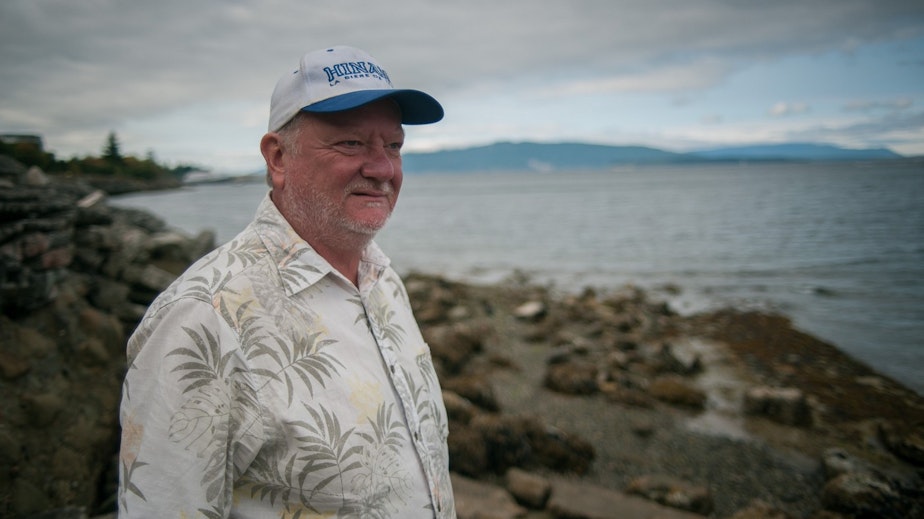
Dan Boxberger, an anthropologist at Western Washington University, says the tales are tall, but they are likely true.
“The common myth was that they were so thick in the stream that you could walk across without getting your feet wet,” Boxberger says. “Some of the early settlers here in Whatcom County talk about how when the salmon runs came, they would pitchfork wagonloads of them and haul them out onto their fields for fertilizer or hog food.”
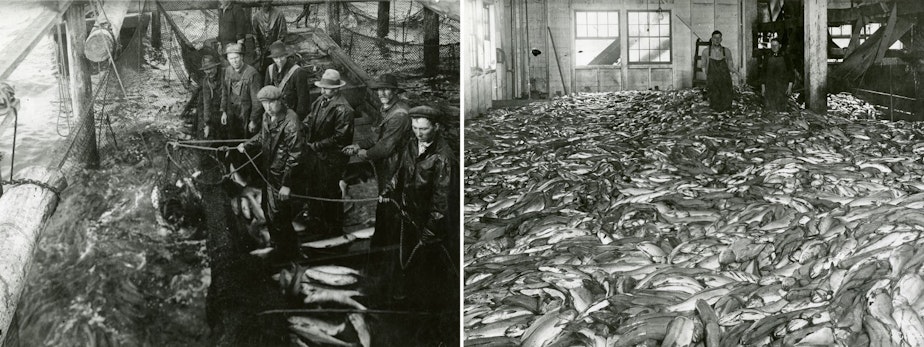
According to cannery records between the 1890s and 1913, more fish were harvested than processed. And more salmon were thrown out in 1913 than were consumed.
In the century since those heady days, returning schools of salmon have grown smaller, partly because of overfishing. The Chinook, or king salmon, have seen the worst of the culling. An estimate from the Puget Sound Partnership suggests there are now two-thirds fewer Chinook salmon.
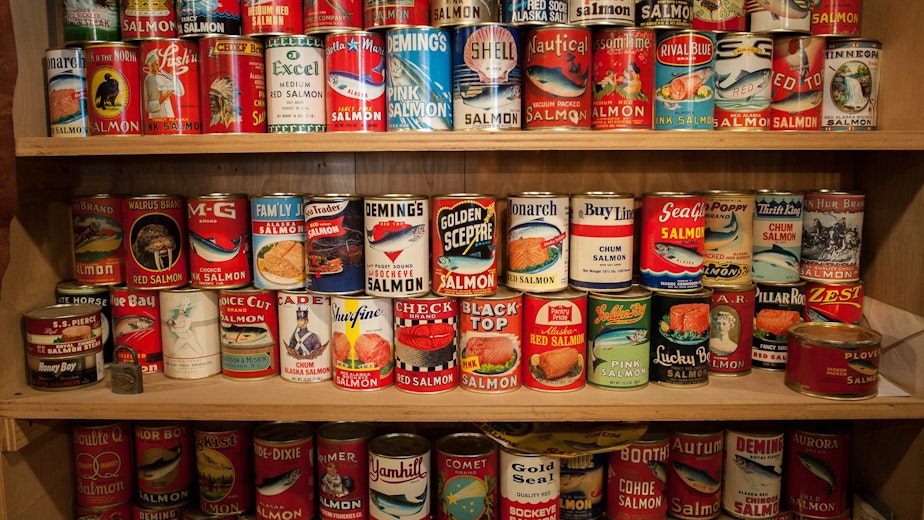
“I don’t really understand how the white man looks at fish,” Morris says. “From my point of view, the way they look at fish, it’s money in their pocket. It’s greed. It’s all money for themselves.”
But for the Lummi, it’s schelangen.
“It’s what we’ve always done,” she says. “We’ve been known as ‘The Salmon People.’ That’s our livelihood. That’s our survival. That helps us survive. So our needs now — we do need the revenue that we get from the fish, to buy these things for our survival.”
Morris points to her clothes. She’s not wearing a cedar bark dress, she tells the interviewer. They are “white man” clothes. But she must use money from fishing to buy those clothes, to survive.
“I guess you call that the evolution of civilization into the white society.”
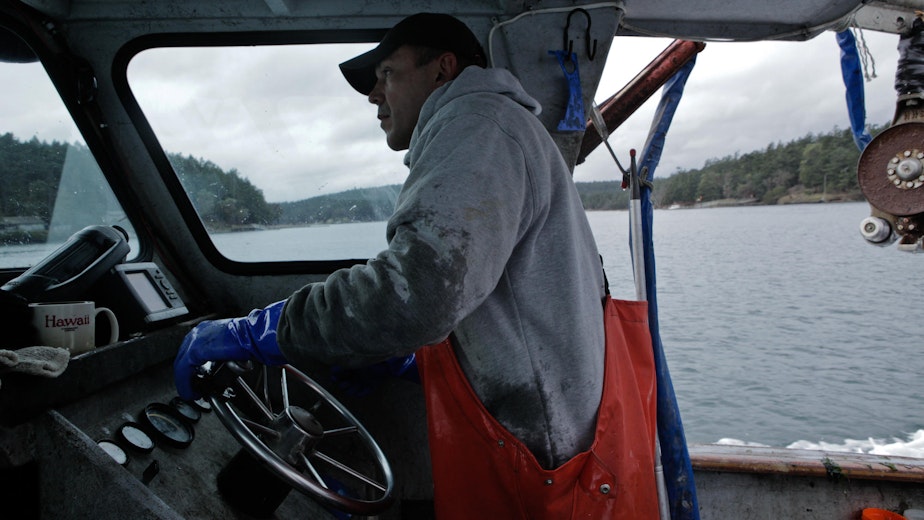
Schelangen, but also a right
T
he waters around Bellingham are so quiet they seem to be hiding secrets.
They’re tranquil, topped by a thin layer of mist that in winter is so gray, it’s hard to see the line between sea and sky. On summer evenings, the waters turn rosy pink from the setting sun.
They’re so still there is little sign of the contentious history that once arose from them — days when coastal tribes of the Salish Sea risked arrest to retain their fishing rights.
Their fight began in the 1850s, when Washington state’s first territorial governor, Isaac Stevens, arrived by boat to speak with tribal leaders. He had been sent by the federal government to secure the land for settlement, which meant that he had to sign treaties with the local tribes.
The treaty with the Lummi was signed in 1855.
For Jay Julius, a member of the Lummi Nation Tribal Council, that doesn’t sound so long ago.
“My great-grandfather was born in 1888, and I fished with him,” Julius says. “And you’ve been to Whatcom Falls. Today it’s a place to swim, jump off a cliff, but that was our village. That’s where my great-great-great-grandfather’s grandparents were at the signing of the treaty. That was our village, which runs down Whatcom Creek, and into the Puget Sound.”

White settlers moving in weren’t interested in fish. They wanted land for farming, logging and mining. Which is why the treaties signed by the Lummi and other tribes in Washington state focus on land, not fishing.
The treaties have the same sentence worked into them: “The right of taking fish from usual and accustomed grounds and stations is further secured to said Indians in common with all citizens of the territory.”
If the settlers wanted fish, for the first fifty years of settlement in Washington, they traded it with the Indians.
But that changed in the early twentieth century.
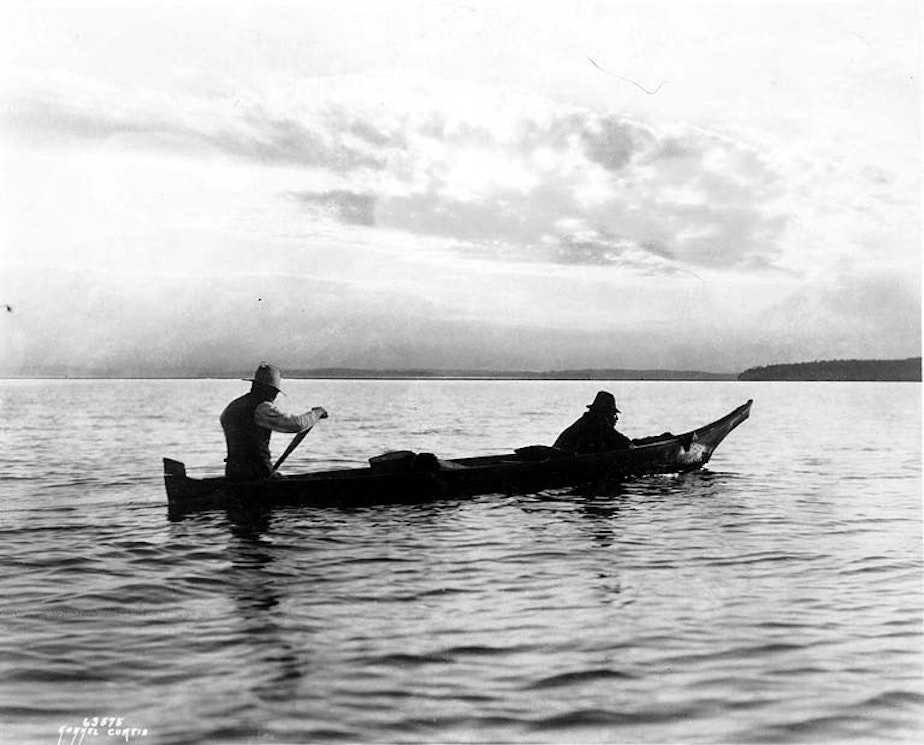
In 1906, Francis Celestin, a Lummi Indian, was fishing off the Lummi reservation as he had always done. But he was arrested because he didn’t have a license.
Celestin’s case was one of the earliest in a long series of cases about fishing rights. With each court decision, it came back to the treaty and those six words, usual and accustomed grounds and stations.
Judges interpreted those words differently, and as the years went on, fishing restrictions for tribes tightened.
The Lummi continued to fish, but their boats headed out after dark, and they fished in ways that were illegal at the time.
Few knew, because the waters rarely betrayed their secrets.
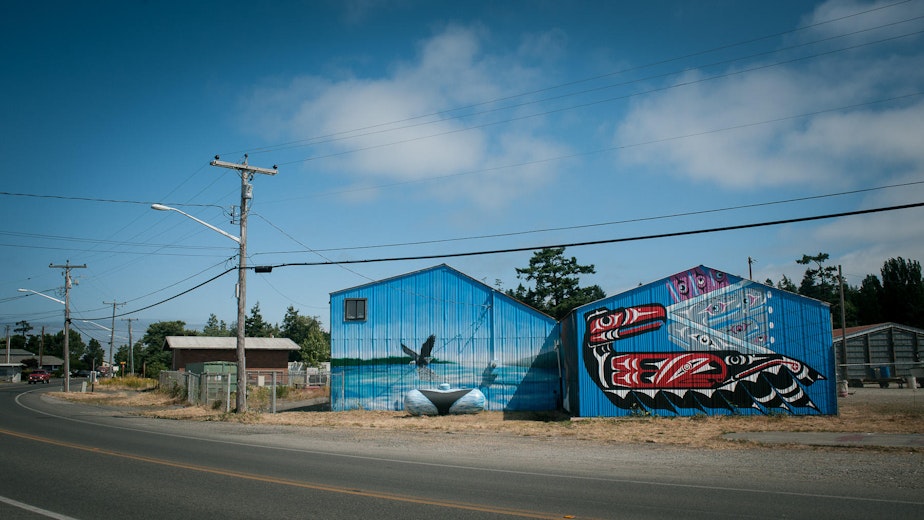
The Fish Wars: Fighting as Northwest salmon run dry
H
undreds of Indians climbed the cliffs at night and waited under the edge of the bluff for the first morning light.
It was the 1960s, and they had come here for centuries, or longer. But on these nights, they were there for their future. They had organized fish-ins — inspired by the sit-ins of the African-American Civil Rights Movement — and intentionally violated laws to bring them into focus. They invited the press to document their arrests.
Among the leaders was Billy Frank Jr., a young member of the Nisqually tribe. Frank was first arrested when he was fourteen for fishing in familiar waters and would ultimately be arrested more than fifty times over the years.
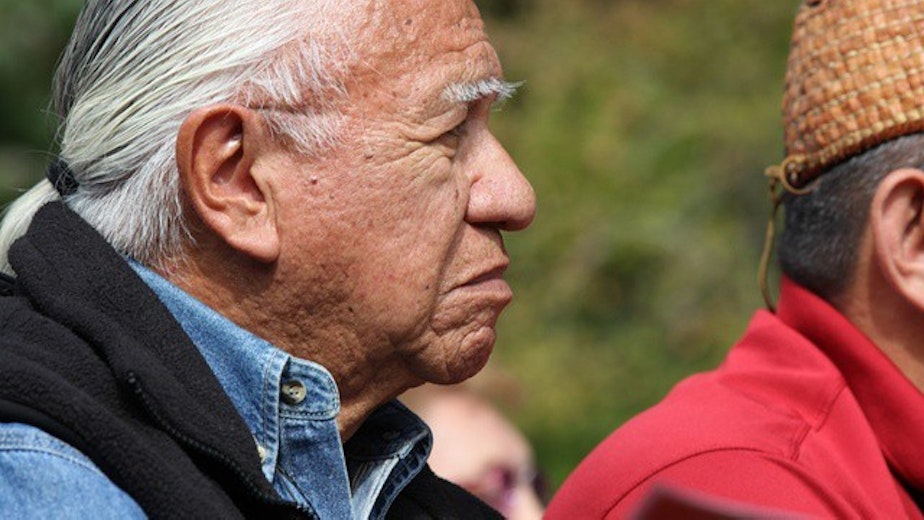
At one of the fish-ins, a newscaster asked him: “If you had to put it in a sentence, what is it that you want in the long run?”
Frank replied: “What we want is to regain and to retain our treaty rights.”
These were tense times, largely because sport and commercial fishing had taken off after World War II. The fishers didn’t like competing with Native Americans and before long, violence broke out. Shots were fired, and boats were overturned and rammed. A bridge in Puyallup was set on fire.
The Fish Wars were underway.
Even actor Marlon Brando got involved. He was arrested during a fish-in and declined the 1972 Oscar for Best Actor for The Godfather to protest how Indians were depicted by Hollywood.
A prosecuting attorney, Stanley Pitkin, witnessed one of the most violent protests in 1970 and filed a case pitting the tribes against the sport and commercial fishing industries.
The case wound up with Judge George Hugo Boldt, a federal district court judge who used it as an opportunity to clear up the ambiguous language of treaties signed with tribes in the 1850s.
In 1974, Judge Boldt issued his decision. In a surprising move, he awarded the tribes half of all catchable fish from Puget Sound. His decision has been challenged up to the U.S. Supreme Court but has always held.
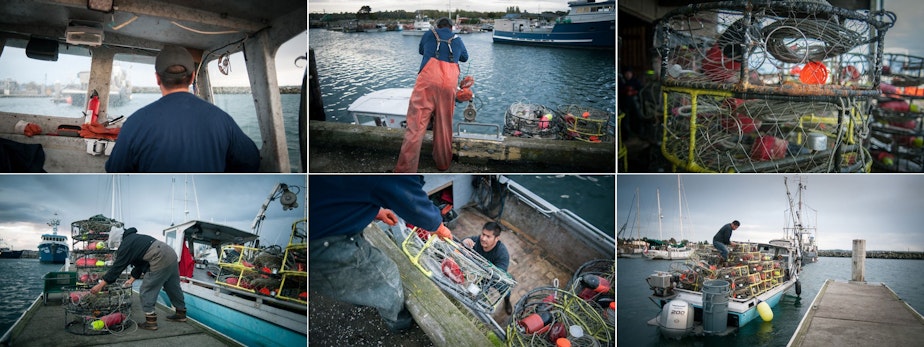
Largely because of the Boldt Decision, the Lummi has one of the largest and most active tribal fishing fleets in the country today.
But the salmon are running dry. In 2013, there were so few sockeye salmon returning to the nearby Fraser River that the Lummi decided not to fish them.
Overfishing isn’t only to blame. There’s also climate change and ocean acidification, water-borne toxins and hypoxia.
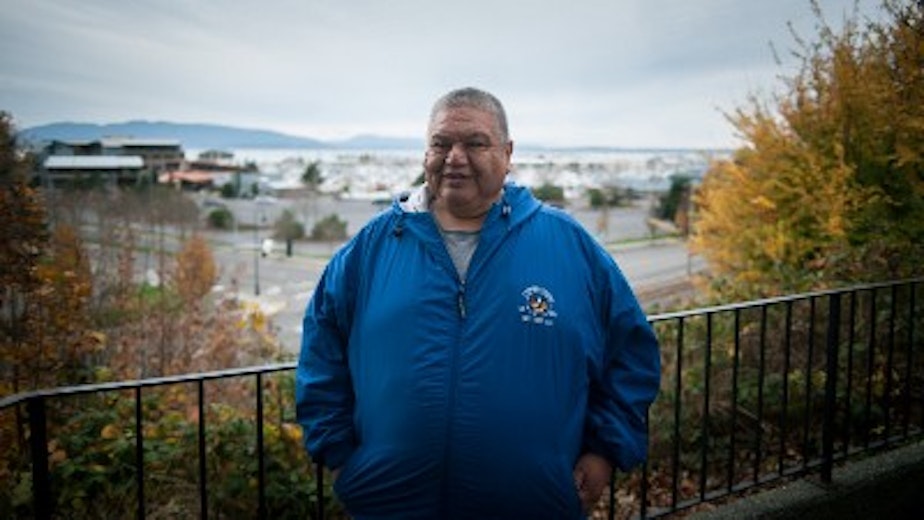
Elden Hillaire, chairman of the Lummi Fisheries Commission, advises the tribe and state agencies.
“I’ve seen the water quality in Bellingham Bay deteriorate, come back, and now it’s starting to deteriorate again,” Hillaire says.
A proposed international coal terminal also could threaten Lummi fishing waters.
“We’re always hopeful,” Hillaire says. “You know, the Great Spirit will guide each and every one of us toward a better life. I just hope it’s in this world.”
Hope came last week in the form of a bill, more than fifty years after tribal members started being convicted of felonies and misdemeanors for illegal fishing. The bill proposes to clear the names of eighty people who were arrested before 1975.
This radio series aired on January 21, 22 and 23, 2014.
Sacred Catch was produced by Jeff Emtman and edited by KUOW senior editor Jim Gates. Hear more of Jeff Emtman’s work and podcasts.
The story was produced by the KUOW Web team: Bond Huberman, Kara McDermott, Jenna Montgomery, Akiko Oda and Isolde Raftery.
Funding for Sacred Catch was provided by the KUOW Program Venture Fund. Contributors include Paul and Laurie Ahern, the KUOW board of directors and listener subscribers.
